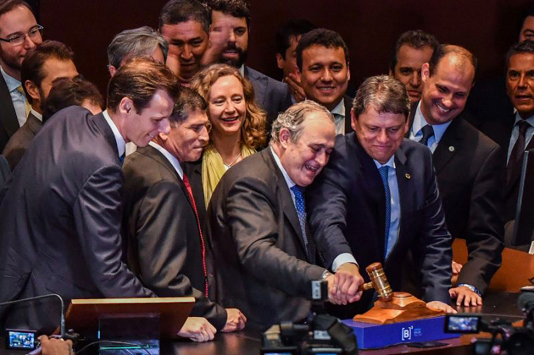RIO DE JANEIRO, March 16, 2019 (BSS/AFP) – Spain’s Aena snapped up six
airports in Brazil on Friday, in an auction seen as the first major test of
foreign investor confidence in President Jair Bolsonaro’s market-friendly
agenda.
The initial sale of concessions to 12 airports generated 2.3 billion reais
($620 million) — more than 10 times the minimum fee required — which
Bolsonaro said signaled “confidence” in Latin America’s biggest economy was
returning.
“It’s Brazil growing again!” the far-right leader tweeted, hailing a
“great victory.”
Rights to operate the airports for 30 years — sold in three separate lots
— were also won by Flughafen Zurich of Switzerland and a Brazilian
consortium, Aeroeste. Nine groups competed.
The administrators must invest 3.5 billion reais during the term of the
concession.
Brazil is to complete the sale of concessions to 42 airports between 2020
and 2022, including Santos Dumont in Rio de Janeiro and Congonhas in Sao
Paulo. The airports auctioned Friday represent 9.5 percent of the domestic
market.
Six airports in northeastern Brazil were bought by Aena, two in the
center-west went to Zurich, and four in the southeast to Aeroeste.
Aena’s successful tender included the auction’s most lucrative prize,
tourist-magnet Recife airport, a destination seen as having the biggest
potential because of its relative proximity to Europe.
Infrastructure minister Tarcisio Freitas said the auction was “a great
demonstration of confidence in the country.”
Bolsonaro’s conservative predecessor Michel Temer initiated a program of
privatizations and concessions.
But Bolsonaro, who came to power in January, has made privatizing state-
owned companies and overhauling the costly pension system key planks of his
policy to reduce soaring public debt and regain investor confidence.
The auction, organized by the National Agency for Civil Aviation and the
Sao Paulo stock exchange, was also seen as a test of the market’s support for
Bolsonaro’s economy minister Paulo Guedes, a US-trained free-marketeer.
Guedes is spearheading the government’s policy to inject pro-business
vigor into an economy still bearing the scars of a record-breaking 2015-2016
recession.
Bolsonaro said previously that of the 138 companies run by the federal
government, “100 could be privatized.”
Brazil ranks among the countries with the highest number of public
companies. But the lack of any detail or progress has disappointed investors.



